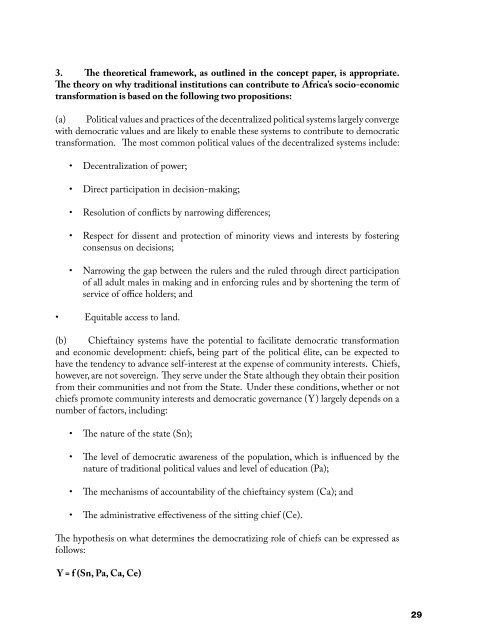Relevance of - United Nations Economic Commission for Africa
Relevance of - United Nations Economic Commission for Africa
Relevance of - United Nations Economic Commission for Africa
You also want an ePaper? Increase the reach of your titles
YUMPU automatically turns print PDFs into web optimized ePapers that Google loves.
3. The theoretical framework, as outlined in the concept paper, is appropriate.<br />
The theory on why traditional institutions can contribute to <strong>Africa</strong>’s socio-economic<br />
trans<strong>for</strong>mation is based on the following two propositions:<br />
(a) Political values and practices <strong>of</strong> the decentralized political systems largely converge<br />
with democratic values and are likely to enable these systems to contribute to democratic<br />
trans<strong>for</strong>mation. The most common political values <strong>of</strong> the decentralized systems include:<br />
• Decentralization <strong>of</strong> power;<br />
• Direct participation in decision-making;<br />
• Resolution <strong>of</strong> conflicts by narrowing differences;<br />
• Respect <strong>for</strong> dissent and protection <strong>of</strong> minority views and interests by fostering<br />
consensus on decisions;<br />
• Narrowing the gap between the rulers and the ruled through direct participation<br />
<strong>of</strong> all adult males in making and in en<strong>for</strong>cing rules and by shortening the term <strong>of</strong><br />
service <strong>of</strong> <strong>of</strong>fice holders; and<br />
• Equitable access to land.<br />
(b) Chieftaincy systems have the potential to facilitate democratic trans<strong>for</strong>mation<br />
and economic development: chiefs, being part <strong>of</strong> the political élite, can be expected to<br />
have the tendency to advance self-interest at the expense <strong>of</strong> community interests. Chiefs,<br />
however, are not sovereign. They serve under the State although they obtain their position<br />
from their communities and not from the State. Under these conditions, whether or not<br />
chiefs promote community interests and democratic governance (Y) largely depends on a<br />
number <strong>of</strong> factors, including:<br />
• The nature <strong>of</strong> the state (Sn);<br />
• The level <strong>of</strong> democratic awareness <strong>of</strong> the population, which is influenced by the<br />
nature <strong>of</strong> traditional political values and level <strong>of</strong> education (Pa);<br />
• The mechanisms <strong>of</strong> accountability <strong>of</strong> the chieftaincy system (Ca); and<br />
• The administrative effectiveness <strong>of</strong> the sitting chief (Ce).<br />
The hypothesis on what determines the democratizing role <strong>of</strong> chiefs can be expressed as<br />
follows:<br />
Y = f (Sn, Pa, Ca, Ce)<br />
29
















